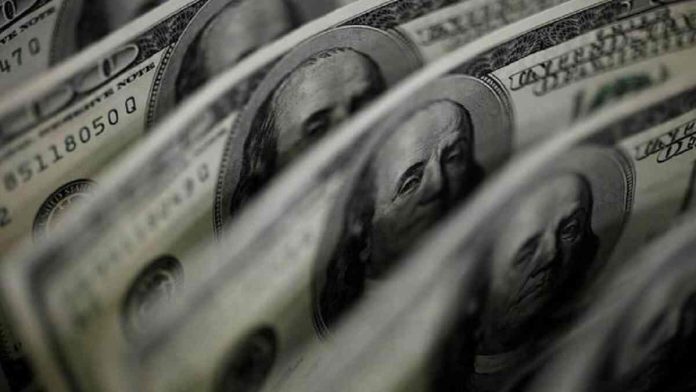Nigeria Repays $1.8bn in Foreign Loans
The Nigerian government redeemed a total sum of $1.8 billion in foreign loans obtained over the past years, analysts said in a commentary note amidst a rising public debt profile. The sum paid includes part of covid-19 advance obtained to cushion the effect of the pandemic in 2020.
Nigeria’s total debt is expected to rise further following recent approval for more foreign loans to finance 2024 budget. The government’s fiscal miss and desire to spend more than its earnings capability remained the main drive of borrowings over the years.
For the authority, it is easier to borrow from local and international debt capital markets to meet government spending plans than to develop revenue sources and raise earnings capability.
“A strong focus on hydrocarbon sales remains a drag on the need to review the economic structure – though well diversified, oil export still accounts for some 80 to 90 per cent of foreign earnings”, research analysts at LSintelligence Associates said in a note.
Last week, the Debt Management Office (DMO) reported that Nigeria experienced a marginal increase of 0.61% in its total public debt, reaching N87.91 trillion as of the third quarter of 2023.
This substantial rise reflects a notable 99.5% year-on-year increase from the corresponding period in 2022 when the total debt stood at N44.06 trillion, debt office report indicates.
Nigeria’s total public debt includes domestic and foreign obligations of the federal government, the 36 state governments, and the federal capital territory.
Public debt of N87.91 trillion ($114.4 billion at an exchange rate of N768.76), encapsulates the combined financial obligations of the federal government, the 36 state governments, and the federal capital territory.
By composition, Nigeria’s public debt was split into N31.98 trillion in external debt and N55.93 trillion in domestic debt.
“Zooming in on the domestic debt structure, it is noteworthy that the N50.19 trillion allocated to the federal government far surpasses the N5.74 trillion designated for the sub-national entities, including the federal capital territory”, Cowry Asset Limited said in a note.
Analysts at the investment firm said this delineation emphasizes the federal government’s predominant role in domestic borrowing, a trend attributable to the multifaceted economic challenges faced by both federal and state governments.
The upswing in domestic debt is ascribed to concerted borrowing initiatives by the federal and state governments, particularly aimed at mitigating the economic reverberations of the Petroleum Motor Spirit (PMS) subsidy removal.
This strategic borrowing, however, underscores a pertinent concern regarding the prioritization of recurrent expenditure over capital expenditure, a fact that warrants scrutiny for sustainable fiscal management, said Cowry Asset in a note.
Analysts said the lion’s share of the N50.19 trillion domestic debt is sourced from government borrowings, with FGN Bonds constituting a substantial 86%, amounting to N43.18 trillion.
The remaining 14% is distributed among various instruments, with Treasury bills and FGN Sukuk leading the pack, indicating a robust demand from investors in recent monthly auctions.
“While the domestic debt increased by N1.80 trillion between June and September 2023, the external debt profile exhibited a positive movement, contracting to $41.59 billion in September 2023.
“This reduction, totalling $1.57 billion or 3.64%, stems from a strategic $500 million Eurobond redemption and a $413.86 million repayment to the International Monetary Fund (IMF).
“This repayment marks the initiation of the principal payment on the $3.4 billion loan obtained from the IMF during the tumultuous COVID-19 pandemic in 2020”, Cowry Asset explained.
For context on the Eurobond repayment, analysts at the firm saw the move by the DMO as a positive development for Nigeria’s Eurobond market and speaks volumes or demonstrates the debt office’s commitment to debt service obligations by redeeming a $500 million Eurobond borrowed in 2013.
“This redemption, along with previous ones at the start of the year, brings the total securities redeemed by Nigeria in the International Capital Market to $1.8 billion.
“The successful redemption showcases Nigeria’s strong debt management operations and planning, reinforcing investor confidence in the country’s financial stability”, Cowry Asset said.
The redemption of the Eurobond is perceived as a positive development for Nigeria’s Eurobond market, demonstrating the Debt Management Office’s commitment to meeting debt service obligations.
Analysts said this move reinforces investor confidence in the country’s financial stability. The total securities redeemed by Nigeria in the International Capital Market, including this Eurobond redemption, amount to $1.8 billion.
In a market report, Cowry Research observes a positive albeit gradual increase in Nigeria’s total debt stock, particularly in the external debt component during the reviewed period.
However, analysts stated that this upward trajectory underscores a continued reliance on borrowing by the government to address budget deficits and fulfil various financial obligations.
“The concentration of this debt within the domestic sphere raises concerns about potential vulnerabilities in local financial markets”, analysts at the firm maintained.
Notably, the disparity in debt levels among individual states is pronounced, with Lagos and Delta carrying the highest burdens and Jigawa and Kebbi having comparably lower debt levels.
A critical metric, the debt-to-GDP ratio, stands at approximately 42% as of the third quarter, signalling a level considered high in comparison to international benchmarks. Analysts said this ratio surpasses recommended thresholds for emerging economies.
The elevated debt-to-GDP ratio raises apprehensions about the sustainability of the debt burden and its potential repercussions on future economic growth. Of significant note is the challenge posed by the scarcity of funds and revenue sources for the federal government.
A substantial portion of government revenue is allocated to debt servicing, limiting the financial resources available for crucial infrastructure projects and social programs. This financial constraint, in turn, necessitates further borrowing to fulfil funding obligations. #Nigeria Repays $1.8bn in Foreign Loans Naira Devaluation Deepens Economic Crisis in Nigeria









